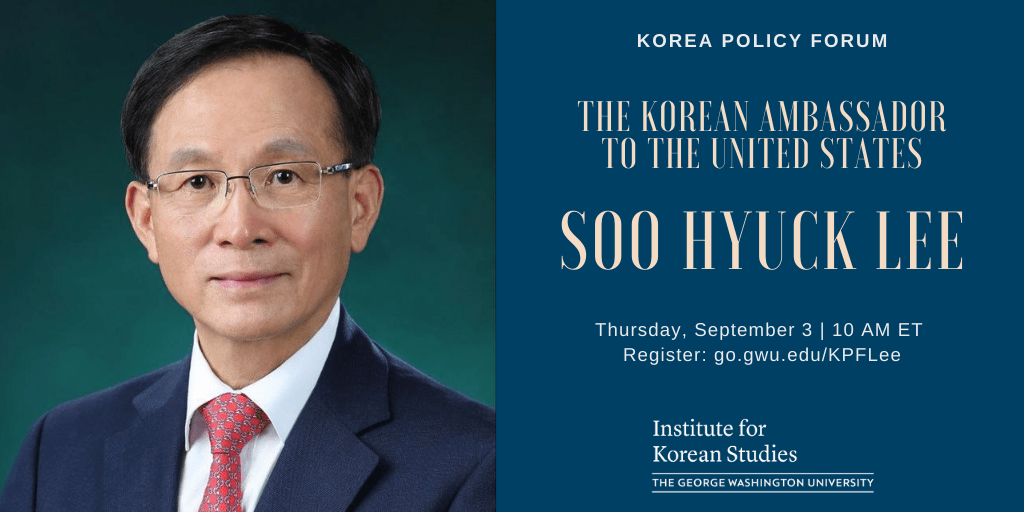Multilateral Cooperation in Northeast Asia in the Biden Era
Monday, May 17, 2021
9:00 AM – 11:00 AM EDT
Virtual Event
This event is on the record and open to the public.
The event will be recorded and made available on GWIKS’ YouTube channel.
Event Description
President Joe Biden laid out his vision of leading the world with allies and friends while emphasizing the reality of intense competition with China on many fronts in his first address to a joint session of Congress. In this complex international landscape, the countries in Northeast Asia face common challenges—including pandemics, climate change, U.S.-China technology rivalry, decoupling of the US-China in the global ICT supply chains, North Korea’s nuclear problem—that cannot be dealt with by individual nations. The upcoming U.S.-ROK summit would shed a light on the pressing need for a cooperative approach to these challenges in the region. Please join the GW Institute for Korean Studies for an online discussion with experts who will be discussing views from the United States and South Korea on regional cooperation in Northeast Asia in the Biden era.
Speakers (Alphabetical Order)
United States
- Cheng Li (Director of the John L. Thornton China Center, Brookings Institution)
- Gregg Brazinsky (Deputy Director of Institute for Korean Studies, The George Washington University)
- Jane Nakano (Senior Fellow, Center for Strategic and International Studies)
- Joseph Yun (Senior Advisor, U.S. Institute of Peace)
- Kristin Vekasi (Associate Professor, The University of Maine)
- Mary Alice Haddad (John E. Andrus Professor of Government, Wesleyan University)
South Korea
- Chaesung Chun (Professor, Seoul National University)
- Jae-Seung Lee (Dean & Jean Monnet Chair, Graduate School of International Studies, Korea University)
- Shin-Wha Lee (Professor, Korea University)
- Sung-Han Kim (Director of Ilmin International Relations Institute, Korea University)
- Young Ja Bae (Professor, Konkuk University)
- Yul Sohn (President, East Asia Institute)
Program

Profiles (Alphabetical Order)
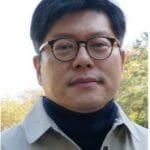 Chaesung Chun is a Professor in the Department of Political Science and International Relations at Seoul National University, teaching international relations theory and security studies. He is the Director of the National Security Center of the East Asian Institute. He is a member of the advisory committee for the Ministry of Foreign Affairs, the Ministry of Defense, and the Ministry of Unification. He was a visiting professor at Keio University in Tokyo from 2017-2018, and from 2010-2011. He was the Director of the Center for International Studies at Seoul National University. The books he has authored include: Sovereignty and International Relations: Northeast Asian International Relations Theory: Politics among Incomplete Sovereign States (2020), Sovereignty and International Relations: Modern Sovereign States System and the Evolution of the Empire (2019), East Asian International Relations (2011), and Is Politics Moral?: Reinhold Niebuhr’s Transcendental Realism (2012). He received his B.A. and M.A. from Seoul National University, and his Ph.D. from Northwestern University in the field of International Relations Theory.
Chaesung Chun is a Professor in the Department of Political Science and International Relations at Seoul National University, teaching international relations theory and security studies. He is the Director of the National Security Center of the East Asian Institute. He is a member of the advisory committee for the Ministry of Foreign Affairs, the Ministry of Defense, and the Ministry of Unification. He was a visiting professor at Keio University in Tokyo from 2017-2018, and from 2010-2011. He was the Director of the Center for International Studies at Seoul National University. The books he has authored include: Sovereignty and International Relations: Northeast Asian International Relations Theory: Politics among Incomplete Sovereign States (2020), Sovereignty and International Relations: Modern Sovereign States System and the Evolution of the Empire (2019), East Asian International Relations (2011), and Is Politics Moral?: Reinhold Niebuhr’s Transcendental Realism (2012). He received his B.A. and M.A. from Seoul National University, and his Ph.D. from Northwestern University in the field of International Relations Theory.
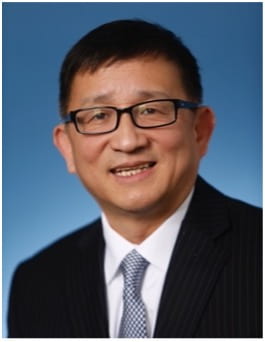 Cheng Li is Director and Senior Fellow at the Brookings Institution’s John L. Thornton China Center. Dr. Li is also a director of the National Committee on U.S.-China Relations, a Distinguished Fellow of the Munk School of Global Affairs and Public Policy at University of Toronto, a nonresident fellow at Yale University’s Paul Tsai China Center, and a member of the Council on Foreign Relations. Li’s research areas include the transformation of political leaders, generational change, the Chinese middle class, technological development in China, and U.S.-China relations. He is the author/editor of numerous books, including Rediscovering China: Dynamics and Dilemmas of Reform (1997), China’s Leaders: The New Generation (2001), Bridging Minds Across the Pacific: The Sino-US Educational Exchange (2005), China’s Changing Political Landscape (2008), China’s Emerging Middle Class (2010), China’s Political Development: Chinese and American Perspectives (2014), Chinese Politics in the Xi Jinping Era: Reassessing Collective Leadership (2016), The Power of Ideas: The Rising Influence of Thinkers and Think Tanks in China (2017), and Middle Class Shanghai: Reshaping U.S.-China Engagement (2021). He is currently completing a book manuscript with the working title Xi Jinping’s Protégés: Rising Elite Groups in the Chinese Leadership. He is the principal editor of the Thornton Center Chinese Thinkers Series published by the Brookings Institution Press. Dr. Li has advised a wide range of U.S. government, education, research, business and not-for-profit organizations on work in China. Dr. Li has frequently been called upon to share his unique perspective and insights as an expert on China. He recently appeared on BBC, CCTV, CNN, C-SPAN, ABC World News, NPR, and PBS. Li received an M.A. in Asian Studies from the University of California at Berkeley and a Ph.D. in Political Science from Princeton University.
Cheng Li is Director and Senior Fellow at the Brookings Institution’s John L. Thornton China Center. Dr. Li is also a director of the National Committee on U.S.-China Relations, a Distinguished Fellow of the Munk School of Global Affairs and Public Policy at University of Toronto, a nonresident fellow at Yale University’s Paul Tsai China Center, and a member of the Council on Foreign Relations. Li’s research areas include the transformation of political leaders, generational change, the Chinese middle class, technological development in China, and U.S.-China relations. He is the author/editor of numerous books, including Rediscovering China: Dynamics and Dilemmas of Reform (1997), China’s Leaders: The New Generation (2001), Bridging Minds Across the Pacific: The Sino-US Educational Exchange (2005), China’s Changing Political Landscape (2008), China’s Emerging Middle Class (2010), China’s Political Development: Chinese and American Perspectives (2014), Chinese Politics in the Xi Jinping Era: Reassessing Collective Leadership (2016), The Power of Ideas: The Rising Influence of Thinkers and Think Tanks in China (2017), and Middle Class Shanghai: Reshaping U.S.-China Engagement (2021). He is currently completing a book manuscript with the working title Xi Jinping’s Protégés: Rising Elite Groups in the Chinese Leadership. He is the principal editor of the Thornton Center Chinese Thinkers Series published by the Brookings Institution Press. Dr. Li has advised a wide range of U.S. government, education, research, business and not-for-profit organizations on work in China. Dr. Li has frequently been called upon to share his unique perspective and insights as an expert on China. He recently appeared on BBC, CCTV, CNN, C-SPAN, ABC World News, NPR, and PBS. Li received an M.A. in Asian Studies from the University of California at Berkeley and a Ph.D. in Political Science from Princeton University.
 Gregg A. Brazinsky is Professor of History and International Affairs and Deputy Director of the Institute for Korean Studies at GW. He also serves as Director of the Asian Studies Program at the Elliott School of International Affairs. His research seeks to understand the diverse and multifaceted interactions among East Asian states and between Asia and the United States. He is the author of Nation Building in South Korea: Koreans, Americans, and the Making of a Democracy (University of North Carolina Press, 2007) and Winning the Third World: Sino-American Rivalry during the Cold War (University of North Carolina Press, 2017). He served as Interim Director of the GW Institute for Korean Studies during the Spring 2017 semester. He received his Ph.D. from Cornell University.
Gregg A. Brazinsky is Professor of History and International Affairs and Deputy Director of the Institute for Korean Studies at GW. He also serves as Director of the Asian Studies Program at the Elliott School of International Affairs. His research seeks to understand the diverse and multifaceted interactions among East Asian states and between Asia and the United States. He is the author of Nation Building in South Korea: Koreans, Americans, and the Making of a Democracy (University of North Carolina Press, 2007) and Winning the Third World: Sino-American Rivalry during the Cold War (University of North Carolina Press, 2017). He served as Interim Director of the GW Institute for Korean Studies during the Spring 2017 semester. He received his Ph.D. from Cornell University.
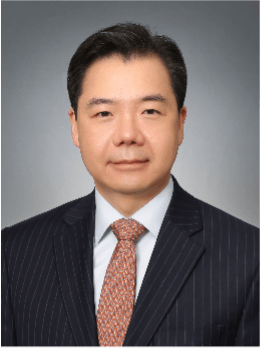 Jae-Seung Lee is Dean and Jean Monnet Chair in the Graduate School of International Studies and Division of International Studies at Korea University. He also serves as Director of the Nordic-Benelux Center and Chairman of the Asia-Europe Energy Policy Research Network (AEEPRN). As a scholar in international political economy, he has authored a number of books and articles on energy security, regional cooperation, and Korea’s foreign policy. His current research focuses on the geopolitics of energy and climate. He is affiliated with the Reischauer Center at Johns Hopkins University (SAIS) as a non-resident visiting scholar. He holds a B.A. in political science from Seoul National University, and an M.A. and Ph.D. in political science from Yale University.
Jae-Seung Lee is Dean and Jean Monnet Chair in the Graduate School of International Studies and Division of International Studies at Korea University. He also serves as Director of the Nordic-Benelux Center and Chairman of the Asia-Europe Energy Policy Research Network (AEEPRN). As a scholar in international political economy, he has authored a number of books and articles on energy security, regional cooperation, and Korea’s foreign policy. His current research focuses on the geopolitics of energy and climate. He is affiliated with the Reischauer Center at Johns Hopkins University (SAIS) as a non-resident visiting scholar. He holds a B.A. in political science from Seoul National University, and an M.A. and Ph.D. in political science from Yale University.
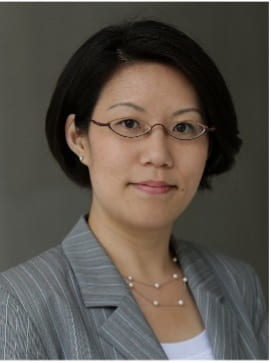 Jane Nakano is a senior fellow in the Energy Security and Climate Change Program at the Center for Strategic and International Studies (CSIS). Her research interests include U.S. energy policy; global market and policy developments concerning natural gas, nuclear energy, and critical minerals; and energy security and climate issues in the Asia-Pacific region. She frequently writes and speaks on these issues at domestic and international conferences, and to media outlets around the world. She has also testified before Congress on U.S. liquefied natural gas (LNG) exports and before the U.S.-China Economic and Security Review Commission on U.S.-China nuclear energy cooperation. Prior to joining CSIS in 2010, Nakano worked in the Office of Policy and International Affairs in the U.S. Department of Energy, where she covered a host of energy, economic, and political issues in Asia. From 2001 to 2002, she served at the U.S. embassy in Tokyo as special assistant to the energy attaché. Nakano graduated from Georgetown University’s School of Foreign Service and holds an M.A. from Columbia University’s School of International and Public Affairs.
Jane Nakano is a senior fellow in the Energy Security and Climate Change Program at the Center for Strategic and International Studies (CSIS). Her research interests include U.S. energy policy; global market and policy developments concerning natural gas, nuclear energy, and critical minerals; and energy security and climate issues in the Asia-Pacific region. She frequently writes and speaks on these issues at domestic and international conferences, and to media outlets around the world. She has also testified before Congress on U.S. liquefied natural gas (LNG) exports and before the U.S.-China Economic and Security Review Commission on U.S.-China nuclear energy cooperation. Prior to joining CSIS in 2010, Nakano worked in the Office of Policy and International Affairs in the U.S. Department of Energy, where she covered a host of energy, economic, and political issues in Asia. From 2001 to 2002, she served at the U.S. embassy in Tokyo as special assistant to the energy attaché. Nakano graduated from Georgetown University’s School of Foreign Service and holds an M.A. from Columbia University’s School of International and Public Affairs.
 Jisoo M. Kim is Korea Foundation Associate Professor of History, International Affairs, and East Asian Languages and Literatures. She currently serves as the Director of the Institute for Korean Studies and the Co-Director of the East Asia National Resource Center at GW. She also serves as the Editor-in-Chief of the Journal of Korean Studies. She is a specialist in gender, law, and emotions in Korean history. Her broader research interests include gender and sexuality, crime and justice, forensic medicine, literary representations of the law, history of emotions, vernacular, and gender writing. She is the author of The Emotions of Justice: Gender, Status, and Legal Performance in Chosŏn Korea (University of Washington Press, 2015), which was awarded the 2017 James Palais Prize of the Association for Asian Studies. She is also the co-editor of The Great East Asian War and the Birth of the Korean Nation by JaHyun Kim Haboush (Columbia University Press, 2016). She is currently working on a book project tentatively entitled Sexual Desire, Crime, and Gendered Subjects: A History of Adultery Law in Korea. She received her M.A., M.Phil., and Ph.D. in East Asian Languages and Cultures from Columbia University.
Jisoo M. Kim is Korea Foundation Associate Professor of History, International Affairs, and East Asian Languages and Literatures. She currently serves as the Director of the Institute for Korean Studies and the Co-Director of the East Asia National Resource Center at GW. She also serves as the Editor-in-Chief of the Journal of Korean Studies. She is a specialist in gender, law, and emotions in Korean history. Her broader research interests include gender and sexuality, crime and justice, forensic medicine, literary representations of the law, history of emotions, vernacular, and gender writing. She is the author of The Emotions of Justice: Gender, Status, and Legal Performance in Chosŏn Korea (University of Washington Press, 2015), which was awarded the 2017 James Palais Prize of the Association for Asian Studies. She is also the co-editor of The Great East Asian War and the Birth of the Korean Nation by JaHyun Kim Haboush (Columbia University Press, 2016). She is currently working on a book project tentatively entitled Sexual Desire, Crime, and Gendered Subjects: A History of Adultery Law in Korea. She received her M.A., M.Phil., and Ph.D. in East Asian Languages and Cultures from Columbia University.
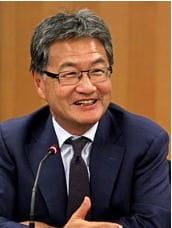 Joseph Yun, recognized as one of the nation’s leading experts on relations with North Korea, as well as on broader U.S.-East Asia policy, most recently served as Special Representative for North Korea Policy. Currently, he is Senior Advisor with The Asia Group, a DC-based strategic consulting firm, and the U.S. Institute of Peace, an independent and non-partisan federal institute working on peace and reconciliation issues throughout the globe. He is also a Global Affairs Commentator for the CNN. Yun’s 33-year diplomatic career has been marked by his commitment to face-to-face engagement as the best avenue for resolving conflict and advancing cross-border cooperation. As Special Representative on North Korea from 2016 to 2018, Ambassador Yun led U.S. efforts to align regional powers behind a united policy to denuclearize North Korea. He was instrumental in reopening the “New York channel,” a direct communication line with officials from Pyongyang. As Principal Deputy Assistant Secretary for East Asian and Pacific Affairs (2011-2013), Yun led efforts to normalize diplomatic relations with Myanmar. Yun also served as Ambassador to Malaysia (2013-16). Before joining the Foreign Service, Yun was a senior economist for Data Resources, Inc., in Lexington, Massachusetts. He holds an M.Phil. degree from the London School of Economics and a B.S. from the University of Wales.
Joseph Yun, recognized as one of the nation’s leading experts on relations with North Korea, as well as on broader U.S.-East Asia policy, most recently served as Special Representative for North Korea Policy. Currently, he is Senior Advisor with The Asia Group, a DC-based strategic consulting firm, and the U.S. Institute of Peace, an independent and non-partisan federal institute working on peace and reconciliation issues throughout the globe. He is also a Global Affairs Commentator for the CNN. Yun’s 33-year diplomatic career has been marked by his commitment to face-to-face engagement as the best avenue for resolving conflict and advancing cross-border cooperation. As Special Representative on North Korea from 2016 to 2018, Ambassador Yun led U.S. efforts to align regional powers behind a united policy to denuclearize North Korea. He was instrumental in reopening the “New York channel,” a direct communication line with officials from Pyongyang. As Principal Deputy Assistant Secretary for East Asian and Pacific Affairs (2011-2013), Yun led efforts to normalize diplomatic relations with Myanmar. Yun also served as Ambassador to Malaysia (2013-16). Before joining the Foreign Service, Yun was a senior economist for Data Resources, Inc., in Lexington, Massachusetts. He holds an M.Phil. degree from the London School of Economics and a B.S. from the University of Wales.
 Kristin Vekasi is an Associate Professor in the Department of Political Science and School of Policy and International Affairs at the University of Maine. Her research interests focus on international political economy, and the dynamics of political conflict, foreign direct investment, nationalism, and the geopolitics of supply chains. She specializes in Northeast Asia, and has spent years conducting research in China, Japan, and South Korea. Her book Risk Management Strategies of Japanese Companies in China (Routledge 2019) explores how Japanese multinational corporations mitigate political risk in China. Her current research examines how Japan, China, and the United States cooperate and compete to manage complex supply chains and infrastructure projects in Southeast Asia. Professor Vekasi received her Ph.D. in political science from the University of Wisconsin, Madison in 2014. Prior to joining the faculty at University of Maine, she taught at New College of Florida, was a visiting Research Fellow at the University of Tokyo and a Fulbright Fellow at Tohoku University. She is a member of the Mansfield Foundation’s US-Japan Network for the Future, and a National Bureau of Asian Research 2019 National Asia Research Program Fellow.
Kristin Vekasi is an Associate Professor in the Department of Political Science and School of Policy and International Affairs at the University of Maine. Her research interests focus on international political economy, and the dynamics of political conflict, foreign direct investment, nationalism, and the geopolitics of supply chains. She specializes in Northeast Asia, and has spent years conducting research in China, Japan, and South Korea. Her book Risk Management Strategies of Japanese Companies in China (Routledge 2019) explores how Japanese multinational corporations mitigate political risk in China. Her current research examines how Japan, China, and the United States cooperate and compete to manage complex supply chains and infrastructure projects in Southeast Asia. Professor Vekasi received her Ph.D. in political science from the University of Wisconsin, Madison in 2014. Prior to joining the faculty at University of Maine, she taught at New College of Florida, was a visiting Research Fellow at the University of Tokyo and a Fulbright Fellow at Tohoku University. She is a member of the Mansfield Foundation’s US-Japan Network for the Future, and a National Bureau of Asian Research 2019 National Asia Research Program Fellow.
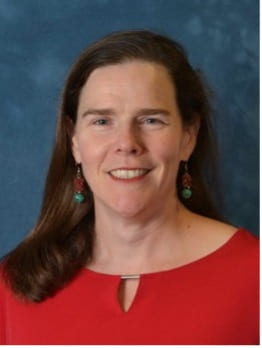 Mary Alice Haddad is the John E. Andrus Professor of Government, Director of the Office for Faculty and Career Development, Chair of the College of East Asian Studies, and Professor of Environmental Studies at Wesleyan University. She has published three books, Effective Advocacy: Lessons from East Asia’s Environmentalists (MIT, 2021), Building Democracy in Japan (Cambridge, 2012), Politics and Volunteering in Japan: A Global Perspective (Cambridge, 2007), and co-edited two more Greening East Asia: The Rise of the Eco-Developmental State co-edited with Ashley Esarey, Joanna Lewis, and Stevan Harrell (University of Washington Press, 2020), and NIMBY is Beautiful: Cases of Local Activism and Environmental Innovation Around the World, co-edited with Carol Hager (Berghahn Books, 2015). Her articles have appeared in journals such as Comparative Political Studies, Democratization, Journal of Asian Studies, and Nonprofit and Voluntary Sector Quarterly. She has received numerous grants and fellowships from organizations such as the Institute of International Education (Fulbright), the Harvard Academy for International and Area Studies, the Japan Foundation, National Endowment for the Humanities, Mellon Foundation, Maureen and Mike Mansfield Foundation, and the East Asian Institute. Her current work examines the role of urban diplomacy in solving global problems and transforming international relations.
Mary Alice Haddad is the John E. Andrus Professor of Government, Director of the Office for Faculty and Career Development, Chair of the College of East Asian Studies, and Professor of Environmental Studies at Wesleyan University. She has published three books, Effective Advocacy: Lessons from East Asia’s Environmentalists (MIT, 2021), Building Democracy in Japan (Cambridge, 2012), Politics and Volunteering in Japan: A Global Perspective (Cambridge, 2007), and co-edited two more Greening East Asia: The Rise of the Eco-Developmental State co-edited with Ashley Esarey, Joanna Lewis, and Stevan Harrell (University of Washington Press, 2020), and NIMBY is Beautiful: Cases of Local Activism and Environmental Innovation Around the World, co-edited with Carol Hager (Berghahn Books, 2015). Her articles have appeared in journals such as Comparative Political Studies, Democratization, Journal of Asian Studies, and Nonprofit and Voluntary Sector Quarterly. She has received numerous grants and fellowships from organizations such as the Institute of International Education (Fulbright), the Harvard Academy for International and Area Studies, the Japan Foundation, National Endowment for the Humanities, Mellon Foundation, Maureen and Mike Mansfield Foundation, and the East Asian Institute. Her current work examines the role of urban diplomacy in solving global problems and transforming international relations.
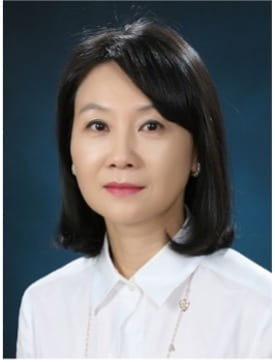 Shin-wha Lee is a Professor in the Department of Political Science and International Relations and Director of Peace and Democracy Institute at Korea University. She serves as President of Korean Academic Council on the United Nations System, a member of Korean Committee on Public Diplomacy, and a member of Trilateral Commission. She received her Ph.D. from University of Maryland at College Park. Her previous positions include a post-doctoral fellow at Harvard University’s Center for International Affairs, Special advisor to UNSG Kofi Annan’s Rwandan Independent Inquiry, Chair’s advisor of East Asian Vision Group, full-time visiting professor at Columbia University, executive committee member of Academic Council on the UN Studies, visiting scholar at MIT’s Center for International Studies, and UN Secretary General’s Advisory Group Member of Peacebuilding Fund. Her numerous publications cover human security, international organizations, East Asian multilateral security and foreign policies.
Shin-wha Lee is a Professor in the Department of Political Science and International Relations and Director of Peace and Democracy Institute at Korea University. She serves as President of Korean Academic Council on the United Nations System, a member of Korean Committee on Public Diplomacy, and a member of Trilateral Commission. She received her Ph.D. from University of Maryland at College Park. Her previous positions include a post-doctoral fellow at Harvard University’s Center for International Affairs, Special advisor to UNSG Kofi Annan’s Rwandan Independent Inquiry, Chair’s advisor of East Asian Vision Group, full-time visiting professor at Columbia University, executive committee member of Academic Council on the UN Studies, visiting scholar at MIT’s Center for International Studies, and UN Secretary General’s Advisory Group Member of Peacebuilding Fund. Her numerous publications cover human security, international organizations, East Asian multilateral security and foreign policies.
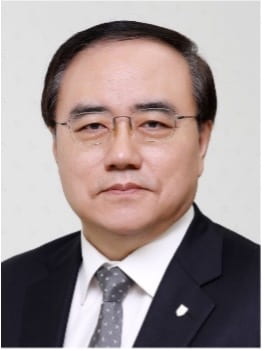 Sung-han Kim is Professor of International Relations at the Graduate School of International Studies (GSIS) and Division of International Studies (DIS) and Director of Ilmin International Relations Institute at Korea University. He was Dean of GSIS and DIS from 2017 to 2021. He served as a Vice Minister of Foreign Affairs and Trade in the Ministry of Foreign Affairs and Trade in 2012-2013. He was a professor from 1994 to 2007 at the Institute of Foreign Affairs and National Security (IFANS) in the Ministry of Foreign Affairs and Trade. In 2013-2014, Dr. Kim was the Chair of World Economic Forum’s Global Agenda Council on WMD. He provided his commitment as the President of the Korean National Committee of CSCAP (Council on Security Cooperation in the Asia Pacific); Vice President of the Korean Association of International Studies; President of the Korean Association of American Politics (KAAP); and Chairman of the Vision Council for the ROK-U.S. Security Policy Initiative. After the North Korean military attack on the Cheonan naval corvette in March 2010, he served as a member of the Presidential Commission for National Security Review (May – August 2010) and the Presidential Commission for Defense Reform (July – December 2010). He received his Ph.D. in Political Science from the University of Texas at Austin. His recent articles contributed to scholarly journals include “Denuclearizing North Korea: Time for Plan B?”, “From Blood Alliance to Strategic Alliance,” “The End of Humanitarian Intervention?” and “The Day After: ROK-U.S. Cooperation for Korean Unification.”
Sung-han Kim is Professor of International Relations at the Graduate School of International Studies (GSIS) and Division of International Studies (DIS) and Director of Ilmin International Relations Institute at Korea University. He was Dean of GSIS and DIS from 2017 to 2021. He served as a Vice Minister of Foreign Affairs and Trade in the Ministry of Foreign Affairs and Trade in 2012-2013. He was a professor from 1994 to 2007 at the Institute of Foreign Affairs and National Security (IFANS) in the Ministry of Foreign Affairs and Trade. In 2013-2014, Dr. Kim was the Chair of World Economic Forum’s Global Agenda Council on WMD. He provided his commitment as the President of the Korean National Committee of CSCAP (Council on Security Cooperation in the Asia Pacific); Vice President of the Korean Association of International Studies; President of the Korean Association of American Politics (KAAP); and Chairman of the Vision Council for the ROK-U.S. Security Policy Initiative. After the North Korean military attack on the Cheonan naval corvette in March 2010, he served as a member of the Presidential Commission for National Security Review (May – August 2010) and the Presidential Commission for Defense Reform (July – December 2010). He received his Ph.D. in Political Science from the University of Texas at Austin. His recent articles contributed to scholarly journals include “Denuclearizing North Korea: Time for Plan B?”, “From Blood Alliance to Strategic Alliance,” “The End of Humanitarian Intervention?” and “The Day After: ROK-U.S. Cooperation for Korean Unification.”
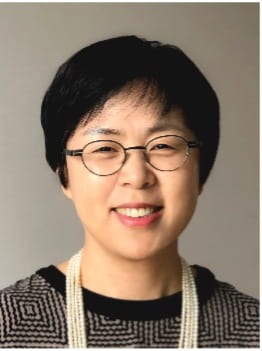 YoungJa Bae is a Professor in the Department of Political Science and Diplomacy at Konkuk University. Dr. Bae received her Ph.D. in political science at University of North Carolina at Chapel Hill and serves on the policy advisory committee to the South Korean Ministry of Foreign Affairs and vice chairman of the Korean Association of International Studies. She was a visiting scholar at National Taiwan University under Taiwan Fellowship. Her main research interests include international politics and S&T, science diplomacy, and international political economy. Her major papers include “Regulations on Foreign Direct Investment and National Security,” “US-China competition and Science and Technology Innovation,” and “S&T Diplomacy as Public Diplomacy: Theoretical Understanding.”
YoungJa Bae is a Professor in the Department of Political Science and Diplomacy at Konkuk University. Dr. Bae received her Ph.D. in political science at University of North Carolina at Chapel Hill and serves on the policy advisory committee to the South Korean Ministry of Foreign Affairs and vice chairman of the Korean Association of International Studies. She was a visiting scholar at National Taiwan University under Taiwan Fellowship. Her main research interests include international politics and S&T, science diplomacy, and international political economy. Her major papers include “Regulations on Foreign Direct Investment and National Security,” “US-China competition and Science and Technology Innovation,” and “S&T Diplomacy as Public Diplomacy: Theoretical Understanding.”
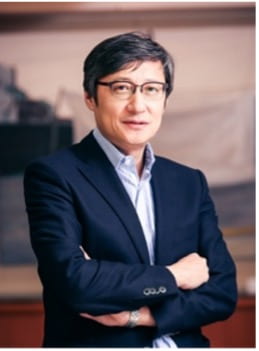 Yul Sohn is the President of the East Asia Institute (EAI) and Professor of the Graduate School of International Studies (GSIS) and Underwood International College at Yonsei University, Seoul, Korea. Sohn served as President of the Korean Association of International Studies (KAIS) in 2019. He also served as Dean of the GSIS (2012-2016) and President of the Association for Contemporary Japanese Studies (2012). Before joining the faculty at Yonsei, Sohn taught at Chung-Ang University, and was a visiting scholar at institutions in the University of Tokyo, Waseda University, the University of North Carolina, Chapel Hill, and the University of California, Berkeley. Sohn has served as a policy advisor on a number of government advisory committees including the Ministry of Foreign Affairs, the Ministry of Trade, the Korea National Diplomatic Academy, the Northeast Asian History Foundation and the Korea Foundation. Sohn has written extensively on Japanese and East Asian political economy, East Asian international relations, and public diplomacy. His most recent publications include Japan and Asia’s Contested Order (2019, with T. J. Pempel) and Understanding Public Diplomacy in East Asia (2016, with Jan Melissen) both from Palgrave MacMillan, and “South Korea under US-China Rivalry: The Dynamics of the Economic-Security Nexus in the Trade Policymaking,” The Pacific Review (2019), 32, 6. Sohn received his Ph.D. in Political Science from the University of Chicago, Illinois.
Yul Sohn is the President of the East Asia Institute (EAI) and Professor of the Graduate School of International Studies (GSIS) and Underwood International College at Yonsei University, Seoul, Korea. Sohn served as President of the Korean Association of International Studies (KAIS) in 2019. He also served as Dean of the GSIS (2012-2016) and President of the Association for Contemporary Japanese Studies (2012). Before joining the faculty at Yonsei, Sohn taught at Chung-Ang University, and was a visiting scholar at institutions in the University of Tokyo, Waseda University, the University of North Carolina, Chapel Hill, and the University of California, Berkeley. Sohn has served as a policy advisor on a number of government advisory committees including the Ministry of Foreign Affairs, the Ministry of Trade, the Korea National Diplomatic Academy, the Northeast Asian History Foundation and the Korea Foundation. Sohn has written extensively on Japanese and East Asian political economy, East Asian international relations, and public diplomacy. His most recent publications include Japan and Asia’s Contested Order (2019, with T. J. Pempel) and Understanding Public Diplomacy in East Asia (2016, with Jan Melissen) both from Palgrave MacMillan, and “South Korea under US-China Rivalry: The Dynamics of the Economic-Security Nexus in the Trade Policymaking,” The Pacific Review (2019), 32, 6. Sohn received his Ph.D. in Political Science from the University of Chicago, Illinois.
Moderators
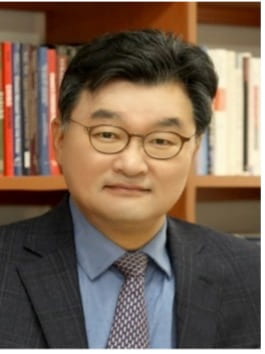 Heung-Kyu Kim is the founder and Director of U.S.-China Policy Institute and professor in the Department of Political Science at Ajou University. He also served as a professor at the Institute of Foreign Affairs and National Security in South Korea’s Ministry of Foreign Affairs. His current assignments include Policy Advisory Board Member for the Ministry of National Defense and ROK Army and Chairman of the Foreign Ministry’s Reform Commission. He also served as Director of Foreign Affairs Subcommittee on the Presidential Commission on Policy Planning, Team Leader of Security and Defense in the Presidential Task Force of Future Vision 2045, a board member of the National Security Council and a board member of National Defense Reform Commission. Dr. Kim’s publications include China and the U.S.-ROK Alliance: Promoting a Trilateral Dialogue (CFR, 2017), Enemy, Homager or Equal Partner?: Evolving Korea-China Relations (2012), From a Buffer Zone to a Strategic Burden: Evolving Sino-North Korea Relations during Hu Jintao Era (2010). His book China’s Central-Local Relations and Decision-Making received an award for Excellency of the Year by the Ministry of Culture in 2008. He also received the NEAR Foundation Academic prize of the year in the area of foreign policy and security in 2014. Kim received his BA and MA in international relations from Seoul National University and Ph.D. in Political Science from the University of Michigan.
Heung-Kyu Kim is the founder and Director of U.S.-China Policy Institute and professor in the Department of Political Science at Ajou University. He also served as a professor at the Institute of Foreign Affairs and National Security in South Korea’s Ministry of Foreign Affairs. His current assignments include Policy Advisory Board Member for the Ministry of National Defense and ROK Army and Chairman of the Foreign Ministry’s Reform Commission. He also served as Director of Foreign Affairs Subcommittee on the Presidential Commission on Policy Planning, Team Leader of Security and Defense in the Presidential Task Force of Future Vision 2045, a board member of the National Security Council and a board member of National Defense Reform Commission. Dr. Kim’s publications include China and the U.S.-ROK Alliance: Promoting a Trilateral Dialogue (CFR, 2017), Enemy, Homager or Equal Partner?: Evolving Korea-China Relations (2012), From a Buffer Zone to a Strategic Burden: Evolving Sino-North Korea Relations during Hu Jintao Era (2010). His book China’s Central-Local Relations and Decision-Making received an award for Excellency of the Year by the Ministry of Culture in 2008. He also received the NEAR Foundation Academic prize of the year in the area of foreign policy and security in 2014. Kim received his BA and MA in international relations from Seoul National University and Ph.D. in Political Science from the University of Michigan.
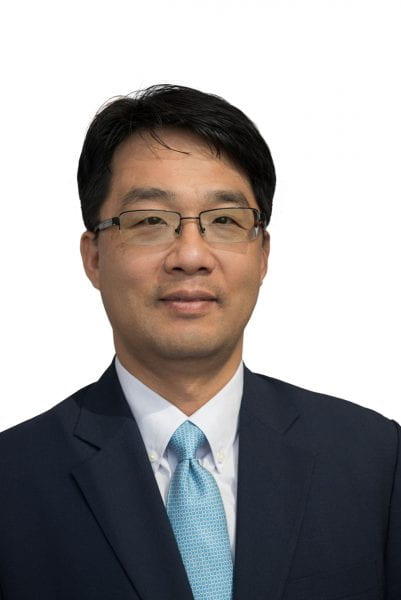 Yonho Kim is an Associate Research Professor of Practice and the Associate Director of GW Institute for Korean Studies. He specializes in North Korea’s mobile telecommunications and U.S. policy towards North Korea. Kim is the author of North Korean Phone Money: Airtime Transfers as a Precursor to Mobile Payment System (2020), North Korea’s Mobile Telecommunications and Private Transportation Services in the Kim Jong-un Era (2019) and Cell Phones in North Korea: Has North Korea Entered the Telecommunications Revolution? (2014). His research findings were covered by various media outlets, including Wall Street Journal, The Atlantic, Yonhap News, and Libération. Prior to joining GWIKS, he extensively interacted with the Washington policy circle on the Korean peninsula as Senior Researcher of the U.S.-Korea Institute at Johns Hopkins University School of Advanced International Studies, Senior Reporter for Voice of America’s Korean Service, and Assistant Director of the Atlantic Council’s Program on Korea in Transition. He holds a B.A. and M.A. in International Relations from Seoul National University, and an M.A. in International Relations and International Economics from Johns Hopkins University School of Advanced International Studies.
Yonho Kim is an Associate Research Professor of Practice and the Associate Director of GW Institute for Korean Studies. He specializes in North Korea’s mobile telecommunications and U.S. policy towards North Korea. Kim is the author of North Korean Phone Money: Airtime Transfers as a Precursor to Mobile Payment System (2020), North Korea’s Mobile Telecommunications and Private Transportation Services in the Kim Jong-un Era (2019) and Cell Phones in North Korea: Has North Korea Entered the Telecommunications Revolution? (2014). His research findings were covered by various media outlets, including Wall Street Journal, The Atlantic, Yonhap News, and Libération. Prior to joining GWIKS, he extensively interacted with the Washington policy circle on the Korean peninsula as Senior Researcher of the U.S.-Korea Institute at Johns Hopkins University School of Advanced International Studies, Senior Reporter for Voice of America’s Korean Service, and Assistant Director of the Atlantic Council’s Program on Korea in Transition. He holds a B.A. and M.A. in International Relations from Seoul National University, and an M.A. in International Relations and International Economics from Johns Hopkins University School of Advanced International Studies.

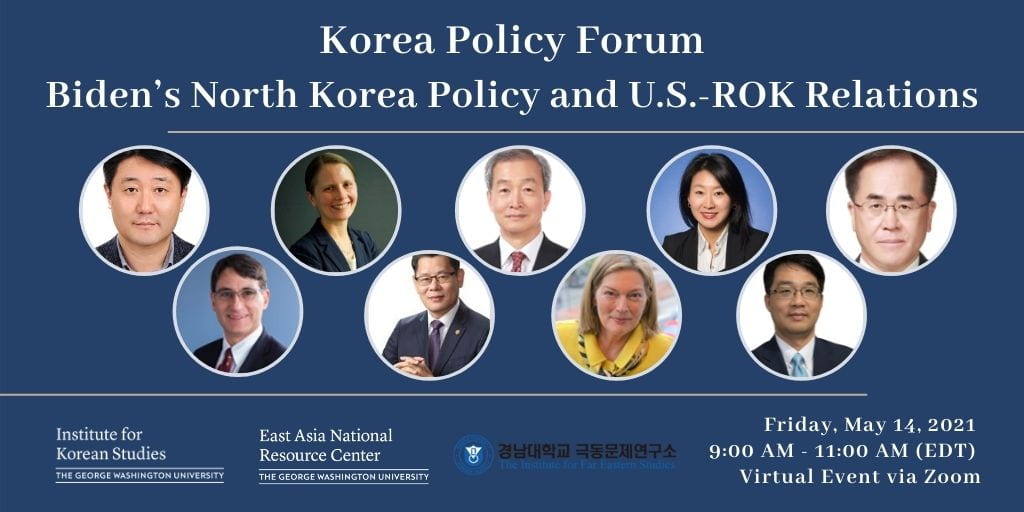
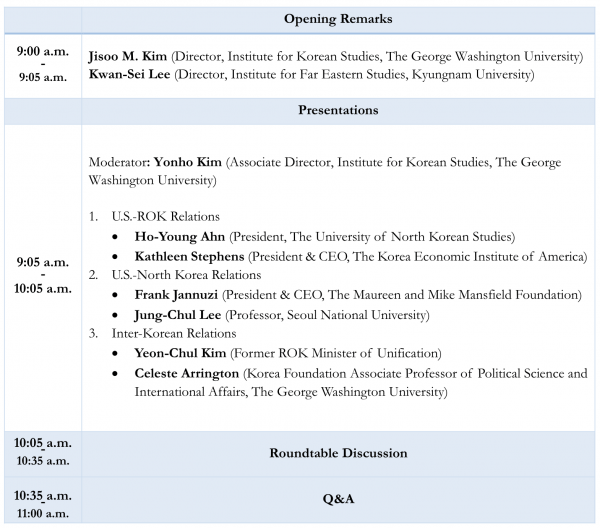
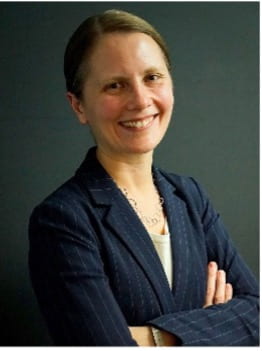
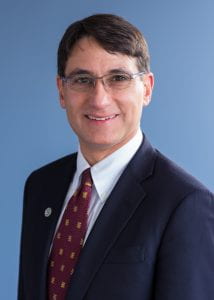
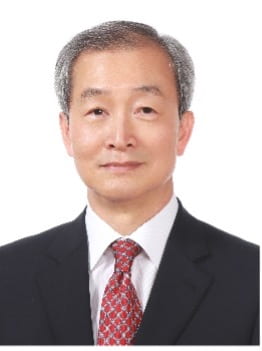

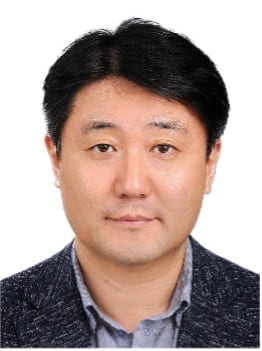

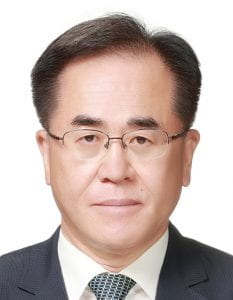
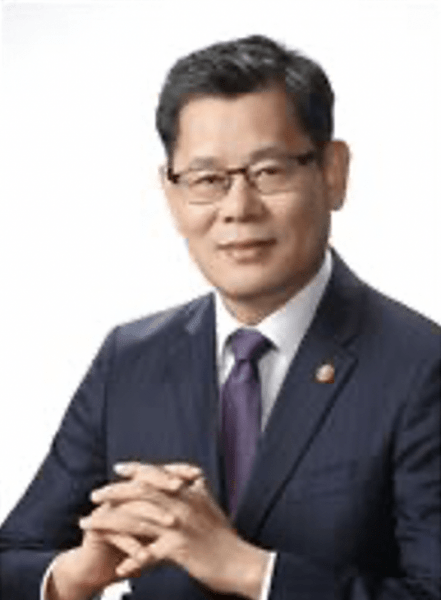


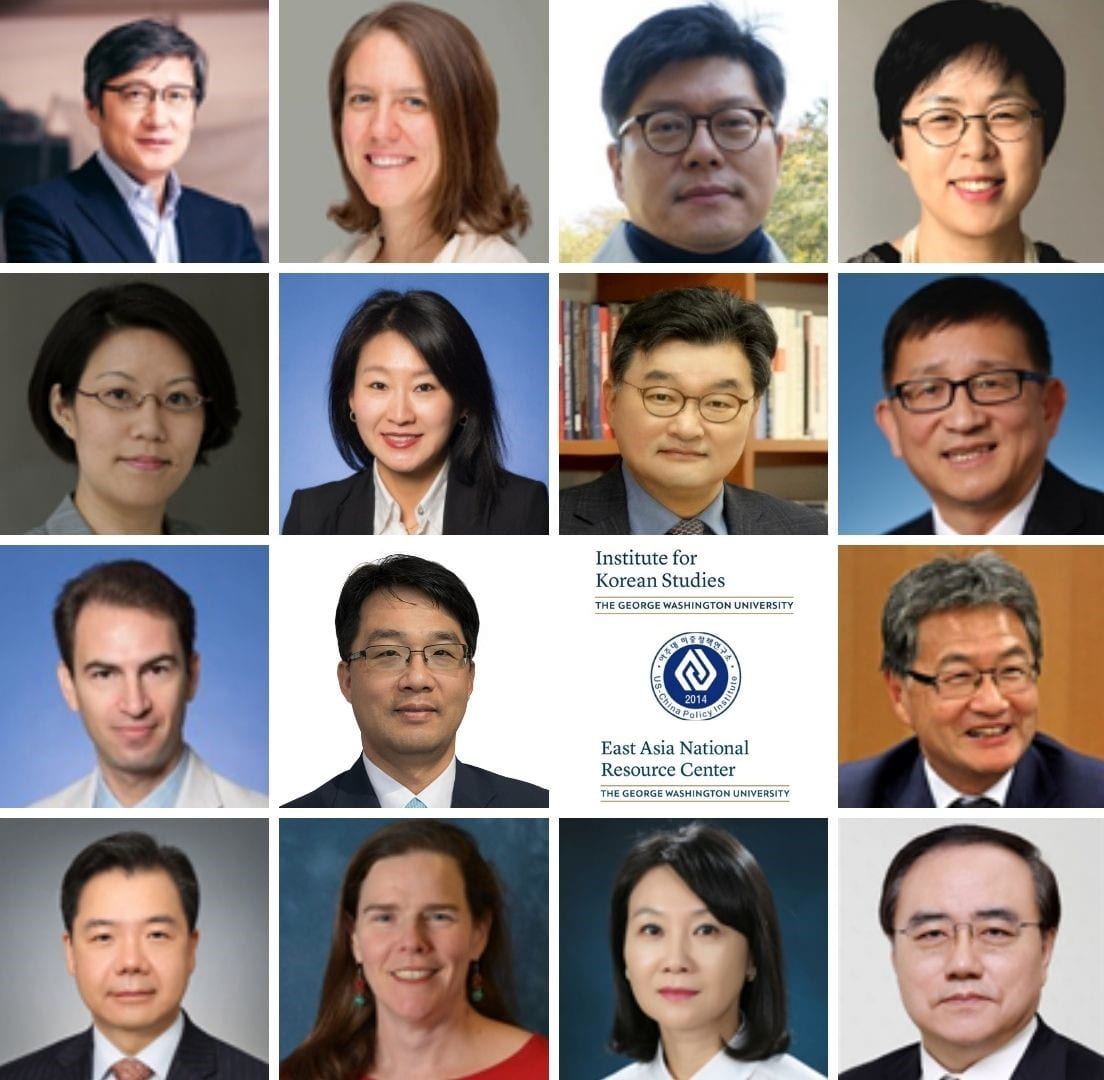

 Chaesung Chun is a Professor in the Department of Political Science and International Relations at Seoul National University, teaching international relations theory and security studies. He is the Director of the National Security Center of the East Asian Institute. He is a member of the advisory committee for the Ministry of Foreign Affairs, the Ministry of Defense, and the Ministry of Unification. He was a visiting professor at Keio University in Tokyo from 2017-2018, and from 2010-2011. He was the Director of the Center for International Studies at Seoul National University. The books he has authored include: Sovereignty and International Relations: Northeast Asian International Relations Theory: Politics among Incomplete Sovereign States (2020), Sovereignty and International Relations: Modern Sovereign States System and the Evolution of the Empire (2019), East Asian International Relations (2011), and Is Politics Moral?: Reinhold Niebuhr’s Transcendental Realism (2012). He received his B.A. and M.A. from Seoul National University, and his Ph.D. from Northwestern University in the field of International Relations Theory.
Chaesung Chun is a Professor in the Department of Political Science and International Relations at Seoul National University, teaching international relations theory and security studies. He is the Director of the National Security Center of the East Asian Institute. He is a member of the advisory committee for the Ministry of Foreign Affairs, the Ministry of Defense, and the Ministry of Unification. He was a visiting professor at Keio University in Tokyo from 2017-2018, and from 2010-2011. He was the Director of the Center for International Studies at Seoul National University. The books he has authored include: Sovereignty and International Relations: Northeast Asian International Relations Theory: Politics among Incomplete Sovereign States (2020), Sovereignty and International Relations: Modern Sovereign States System and the Evolution of the Empire (2019), East Asian International Relations (2011), and Is Politics Moral?: Reinhold Niebuhr’s Transcendental Realism (2012). He received his B.A. and M.A. from Seoul National University, and his Ph.D. from Northwestern University in the field of International Relations Theory.













